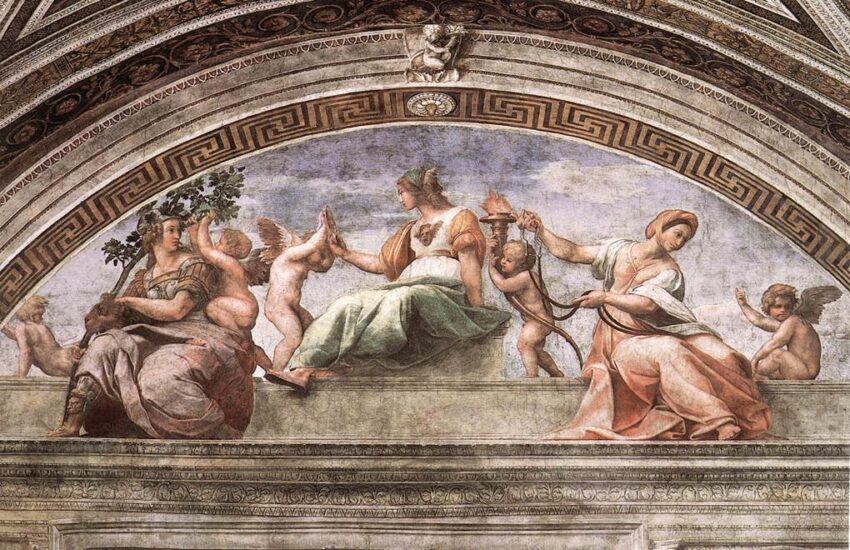“Patience is a virtue.” – William Langland said in his 14th-century poem ‘Piers Plowman’.
We’ve all heard that “Patience is a virtue”, and it’s easy to assume that by “virtue” what is meant is “good habit.” In fact, Aristotle said for the Magnanimous Man that “Virtues of characters result from following the right habits and the virtues of thinking need teaching, experience and time.”
But, what is virtue, really? The idea of virtue is much older than the word, afterall. For example, five millennia ago, ancient Egyptians developed a concept known as Maat. Maat (or Ma’at) was the ancient Egyptian goddess of truth, balance, order, law, morality, and justice. The word “maat” was also used to refer to these concepts and was the opposite of chaos, injustice, and dishonesty. These ways of being are seen throughout history in various cultures as the good habits that, ultimately, become virtues.
Making matters more complex, authors tend to define virtue in terms of various virtuous traits, rather than addressing the word “virtue” directly. As a result, the definition of the word is fluid, changing over time, circumstance, and culture.
What Is The Etymology Of The Word “Virtue”?
Etymology is the study and investigation of the origin of words in a particular language.
According to Etymonline and Wikipedia, the word “virtue” ultimately comes from the Proto-Indo-European (PIE) root “wi-ro”, meaning “man”. PIE is hypothesized to have been spoken as a single language from approximately 4500 BCE to 2500 BCE during the Late Neolithic to Early Bronze Age.
According to the Youth Leadership Foundation, the word “virtue” is a modern translation of the word from Greek and Latin origins. Arete (or aretai) is a Greek term meaning “character excellences” or “excellence in being”. When translated into Latin, the word is “virtus,” meaning, “effectiveness in action”.
According to Virtue – An Inspirational Etymology, the word “virtue” derives from the Latin word ‘Virtus’, which in turn derives from the Latin word ‘Vir’.
‘Vir’ was the ancient Roman word for ‘man’, but ‘vir’ was also strongly linked to concepts such as martial courage, resilience, and the honor associated with these qualities. As the Roman empire expanded, the word ‘vir’ became associated with other essential qualities, such as industry, fortitude, diligence, and dutifulness.
According to Etymonline, the word “virtue” comes to us in the 10th-century from the Old French “vertu”, meaning “force, strength, vigor; moral strength; qualities, abilities”, and in the 12th-century from the Anglo-French “vertu”, meaning “moral life and conduct; a particular moral excellence.”
Finally, according to the Oxford English Dictionary (OED), the earliest known use of the noun “virtue” is in the Middle English period of history (from 1150 to 1500). The OED’s earliest evidence for the word is from around 1225, found in Hali Meidenhad: An Alliterative Homily Of The Thirteenth Century.
What Is The Definition Of The Word “Virtue”?
Let’s come to a definition of “virtue” now that we have an understanding of the history of this word. First we take a look at “virtue” as defined by those that came before us.
According to preparingyou, virtue is “the ‘character muscle’ of the individual.”
Virtues are our “guide to growing up”, according to Virtue – An Inspirational Etymology.
Virtue is “the conformity of life and conduct with the principles of morality”, according to Britannica.
According to Rabbit, the definition of the word “virtue” is: “the quality of doing what is right and avoiding what is wrong.”
Dictionary.com presents a definition similar to that of Britannica: Virtues are “conformity of one’s life and conduct to moral and ethical principles.”
In ‘Soliloquia 1’ St. Augustine says, “A virtue is right and perfected reason.”
According to Manuel Velasquez in ‘Ethics and Virtue’, virtues are “attitudes, dispositions, or character traits that enable us to pursue the ideals we have adopted. Virtues are developed through learning and through practice. Virtues are habits.”
In ‘Rhetorica’ Cicero also references virtue as habit: “A virtue is a habit consonant with reason in the manner of a nature.”
According to Wikipedia, a virtue is a “trait of excellence, including traits that may be moral, social, or intellectual.” This is helpful – in most articles, there is neither clear distinction between the moral and social traits of virtue, nor is there clarity on the differences between personal and group virtues.
To that point: “While traditional virtue theory focused on individuals, there has been an increased interest in virtues and vices that can be attributed to whole groups, over and above those that are merely possessed by their individual members,” according to Mark Alfano, ‘Social Virtue Epistemology’
Taking all of the above into consideration, we can come to a definition of the word “virtue”. Virtue is: “conformity of one’s life and conduct to moral and ethical principles, the quality of doing what is right and avoiding what is wrong, the ‘character muscle’ of the individual that leads to traits of excellence, and the habits that guide us to and through adulthood”.
Thanks for reading!
